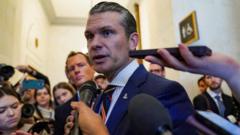The confirmation hearings for Donald Trump’s nominees begin this week, marking a significant moment in his administration as key allies are poised to face intense questioning from senators. Although Trump's party has a majority in the Senate, any dissent could derail the confirmation of nominees for top-level positions.
One of the first high-profile hearings will involve Pete Hegseth, Trump's choice for defense secretary, who will likely be confronted about his controversial past, which includes allegations of sexual misconduct and questioning over his management experience. Notably, he is under scrutiny for his past opposition to women serving in combat roles and has faced allegations of heavy drinking. While Hegseth denies the allegations against him, the discussions around his candidacy are proving to be sensitive.
Turning to Kristi Noem, the nominee for homeland security, senators will likely probe the feasibility and legality of Trump's ambitious deportation plans. As an advocate of Trump's rhetoric on immigration, she may be challenged about the conditions under which such policies could be instituted and their broader societal effects.
Marco Rubio, a former rival of Trump, has a potentially smoother confirmation journey as he aims for the secretary of state position. However, he may face inquiries regarding U.S. support for Ukraine amid Trump's skepticism of continued aid, testing the limits of Rubio’s alignment with the administration's foreign policy priorities.
Other nominees such as Howard Lutnick, who is expected to oversee the implementation of sweeping tariffs, could see critical discussions about economic impacts arising from proposed trade policies. Similarly, Tulsi Gabbard, nominated for national intelligence director, may be examined on her previous positions on Russia, raising questions about her reliability as part of U.S. intelligence efforts.
Moreover, Robert F. Kennedy Jr., with no medical background chosen for health and human services secretary, could be cornered about his controversial health views and public trust issues related to vaccines. Lastly, Kash Patel, nominated to lead the FBI, is anticipated to encounter skepticism about his qualifications amidst concerns of political motivations affecting law enforcement impartiality.
As these nominees prepare for their hearings, the political stakes are high, not just for Trump's administration, but for legislative relations in the Senate and implications of each nominee's proposed policies on American society moving forward.


















